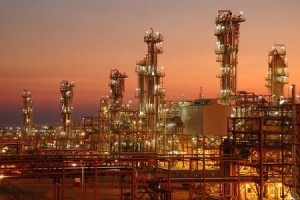[caption id="attachment_27590" align="alignright" width="147"] A view of Iran's South Pars Gas and Oil Field[/caption]
A view of Iran's South Pars Gas and Oil Field[/caption]
TEHRAN (FNA)- Exports of gas condensates from Pars Special Economic Energy Zone (PSEEZ) increased by nearly 76 percent in the first seven months of the current Iranian year (March 21-October 22) compared to the corresponding period last year.
Iran exported 6.424 million tons of gas condensates worth $5.8 billion showing a rise of 41 percent in weight and 76 percent increase in value, Iran's Customs Administration announced in a statement on Saturday.
The main destinations of the Iranian condensates supplies were China, Iraq, the United Arab Emirates (UAE), Afghanistan and India.
The PSEEZ was established in 1998 for the utilization of South ?Pars oil and gas resources and encouraging commercial activities in the field of oil, gas and ?petrochemical industries.?
The South Pars gas field, divided into 28 phases, is located in the Persian Gulf on the common border between Iran and Qatar. The field is estimated to contain 14 trillion cubic meters of gas and 18 billion barrels of condensates.
The field covers an area of 9,700 square kilometers, 3,700 square kilometers of which lie in Iran's territorial waters in the Persian Gulf. The remaining 6,000 square kilometers, i.e. North Dome, are located in Qatar's territorial waters.
Earlier this year, Iranís Oil Minister Bijan Namdar Zanganeh said the countryís gas condensate exports have not been affected after the US government penalized dozens of Iranian and foreign companies for violating sanctions imposed on Tehran.
ďThe embargo on selling gas condensate was in effect beforehand and it has just been announced officially, but it has not had any decisive effect on the gas condensate sales,Ē Zanganeh said.
Zanganeh's remarks came after US announcement of a fresh round of bans on over 25 individuals and companies, including shipping firms, oil companies, airlines and six banks over alleged links with Iranís nuclear energy program.
The companies targeted by the US sanctions included UAE-based Goldentex FZE, cooperating with Iranís shipping sector, and Italian firm Dettin SpA, collaborating with Iranís petrochemical industry.
At the beginning of 2012, the United States and the European Union imposed sanctions on Iranís oil and financial sectors with the goal of preventing other countries from purchasing Iranian oil or extending insurance coverage for tankers carrying Iranian crude.
By Fars News Agency
The Iran Project is not responsible for the content of quoted articles.

 QR code
QR code